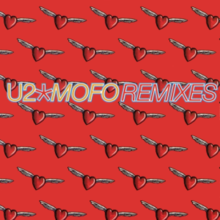
U2 are an Irish rock band formed in Dublin in 1976. The group comprises Bono, the Edge, Adam Clayton, and Larry Mullen Jr.. Initially rooted in post-punk, U2's musical style has evolved throughout their career, yet has maintained an anthemic quality built on Bono's expressive vocals and the Edge's chiming, effects-based guitar sounds. Bono's lyrics, often embellished with spiritual imagery, focus on personal and sociopolitical themes. Popular for their live performances, the group have staged several elaborate tours over their career.

David Howell Evans, better known as the Edge or simply Edge, is a British-Irish musician, singer, and songwriter. He is best known as the lead guitarist, keyboardist, and backing vocalist of the rock band U2. A member of the group since its inception, he has recorded 15 studio albums with them as well as one solo record. His understated style of guitar playing, a signature of U2's music, is distinguished by chiming timbres, use of rhythmic delay, drone notes, harmonics, and an extensive use of effects units.

Pop is the ninth studio album by Irish rock band U2. It was produced by Flood, Howie B, and Steve Osborne, and was released on 3 March 1997 on Island Records. The album was a continuation of the band's 1990s musical reinvention, as they incorporated alternative rock, techno, dance, and electronica influences into their sound. Pop employed a variety of production techniques that were relatively new to U2, including sampling, loops, programmed drum machines, and sequencing.
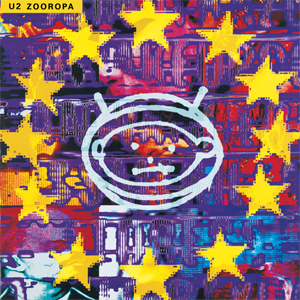
Zooropa is the eighth studio album by Irish rock band U2. Produced by Flood, Brian Eno, and the Edge, it was released on 5 July 1993 on Island Records. Inspired by the band's experiences on the Zoo TV Tour, Zooropa expanded on many of the tour's themes of technology and media oversaturation. The record was a continuation of the group's experimentation with alternative rock, electronic dance music, and electronic sound effects that began with their previous album, Achtung Baby, in 1991.

"Discothèque" is a song by Irish rock band U2. It is the opening track on their 1997 album, Pop, and was released as its lead single on 3 February 1997 by Island Records. The song exhibits influences from electronic dance music, characteristic of the band's musical direction in the 1990s. The music video, directed by Stéphane Sednaoui, was set inside of a mirrorball and featured the band members dressed as members of the disco group the Village People.

"Stuck in a Moment You Can't Get Out Of" is a song by Irish rock band U2. It is the second track on their tenth studio album, All That You Can't Leave Behind (2000), and was released as the album's second single on 29 January 2001. The band's lead vocalist Bono has said the song was inspired by a fictional conversation with his friend Michael Hutchence about suicide. The song peaked at number 52 on the US Billboard Hot 100 and topped the charts in Canada, their native Ireland, and Italy, while reaching the top 10 in Australia, Denmark, Finland, the Netherlands, Norway, Spain and the United Kingdom. In 2002, the song won the Grammy Award for Best Pop Performance by a Duo or Group with Vocal at the 44th Annual Grammy Awards ceremony.
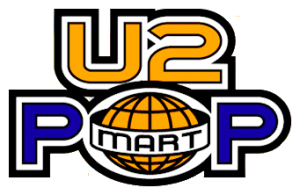
The PopMart Tour was a worldwide concert tour by rock band U2. Staged in support of the group's 1997 album Pop, the tour's concerts were performed in stadiums and parks in 1997 and 1998. Much like the band's previous Zoo TV Tour, PopMart was an elaborate production. Its lavish stage design had a 165-foot-wide (50 m) LED screen, a 100-foot-high (30 m) golden arch, and a large mirror-ball lemon. As with the Zoo TV Tour, the band delivered an image and performance that were ironic and self-mocking on PopMart, deviating from their earnest performances of the 1980s; the band performed in costumes that, along with the stage design, poked fun at the themes of consumerism and pop culture.

"Elevation" is a song by Irish rock band U2. It is the third track on their tenth studio album, All That You Can't Leave Behind (2000), and was released as the album's third single on 25 June 2001. The song became the band's 16th number-one single in their native Ireland and their second number one in the Netherlands. It also topped the charts in Canada and reached the top 10 in Australia, Denmark, Finland, Italy, Norway, Scotland, Spain, and the United Kingdom. A different mix of the song, entitled the "Tomb Raider mix", was included on the soundtrack of the 2001 film Lara Croft: Tomb Raider. In 2002, "Elevation" won the Grammy Award for Best Rock Performance by a Duo or Group with Vocal at the 44th Annual Grammy Awards ceremony. The song lent its namesake to the band's 2001 Elevation Tour.
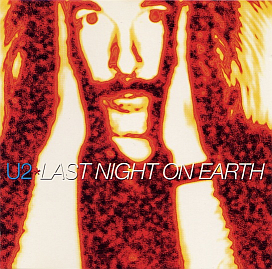
"Last Night on Earth" is a song by Irish rock band U2. It is the sixth track on their 1997 album, Pop, and was released by as its third single on 1 July 1997 by Island Records. The song includes excerpts from "Trayra Boia", written by Naná Vasconcelos and Denise Milan. It's music video was directed by Richie Smyth and filmed in the US.
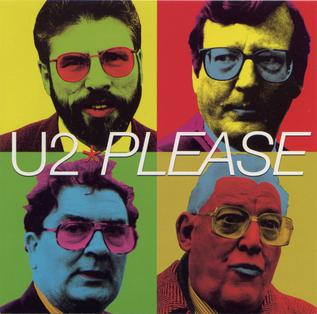
"Please" is a song by Irish rock band U2. It is the eleventh track on their ninth album, Pop (1997), and was released as its fourth single on 22 September 1997 by Island Records. As with "Sunday Bloody Sunday", the song is about The Troubles in Northern Ireland. The single cover for this song features pictures of four Northern Irish politicians – Gerry Adams, David Trimble, Ian Paisley, and John Hume. Two months before the release of the single, live versions of "Please" and three other songs from the PopMart Tour were released on the Please: PopHeart Live EP in September 1997.

"If God Will Send His Angels" is a song by Irish rock band U2. It is the fourth track on their 1997 album, Pop, and was released as its fifth single on 8 December 1997. It was also featured on the City of Angels soundtrack.

"Numb" is a song by Irish rock band U2. It is the third track from their eighth album, Zooropa (1993), and was released in June 1993 by Island Records and PolyGram as the album's first single. The song features a monotonous mantra of "don't" commands spoken by guitarist the Edge amidst a backdrop of various sound effects and samples. The noisy composition and lyrical concept for "Numb" were inspired by the theme of sensory overload, which had prominently been incorporated into the Zoo TV Tour. Lead singer Bono and drummer Larry Mullen Jr. provided backing vocals on the track.
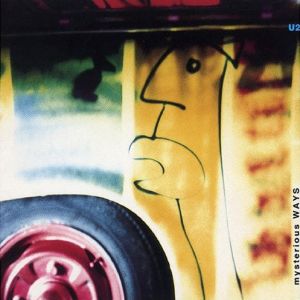
"Mysterious Ways" is a song by Irish rock band U2. It is the eighth track from their 1991 album, Achtung Baby, and was released as the album's second single on 2 December 1991, two weeks after the album. The song began as an improvisation called "Sick Puppy", with the band liking only the bass part that bassist Adam Clayton composed. The band struggled to build a song from it, with vocalist Bono and producer Daniel Lanois arguing intensely during one songwriting session. The song's breakthrough came after guitarist the Edge began experimenting with the Korg A3 effects unit. "Mysterious Ways" features a danceable beat, funky guitar hook, and conga-laden percussion, as well as mystical lyrics by Bono about romance and women.

"The Fly" is a song by Irish rock band U2. It is the seventh track from their 1991 album, Achtung Baby, and it was released as the album's first single on 21 October 1991 by Island Records. "The Fly" introduced a more abrasive-sounding U2, as the song featured danceable hip-hop beats, industrial textures, distorted vocals, and an elaborate guitar solo. Lead vocalist Bono described the song as "the sound of four men chopping down The Joshua Tree", due to its departure from the sound that had traditionally characterised the band in the 1980s.

PopMart: Live from Mexico City is a concert film by Irish rock band U2. It was shot on 3 December 1997 at Foro Sol in Mexico City, Mexico, during their PopMart Tour. It was released on VHS and Video CD in November 1998, and was re-released in September 2007 on DVD. It was nominated for the Grammy Award for Best Long Form Music Video in 2000. Select songs from the release were featured on the 2000 live album Hasta la Vista Baby! U2 Live from Mexico City.
"Bullet the Blue Sky" is a song by Irish rock band U2, and is the fourth track from their 1987 album The Joshua Tree. Lyrically, the song was inspired by a trip that lead vocalist Bono made to Nicaragua and El Salvador, where he saw firsthand how local peasants were affected by United States military intervention in the region. Angered by what he witnessed, Bono asked guitarist the Edge to "put El Salvador through an amplifier." "Bullet the Blue Sky" is one of the band's most overtly political songs, with live performances often being heavily critical of political conflicts and violence.
"Zoo Station" is a song by Irish rock band U2. It is the opening track from their 1991 album Achtung Baby, a record on which the group reinvented themselves musically by incorporating influences from alternative rock, industrial, and electronic dance music. As the album's opening track, "Zoo Station" introduces the band's new sound, delivering industrial-influenced percussion and several layers of distorted guitars and vocals. Similarly, the lyrics suggest the group's new intents and anticipations. The introduction, featuring an "explosion" of percussion and a descending glissando for a guitar hook, was meant to make the listener think the album was mistakenly not U2's latest record or that their music player was broken.
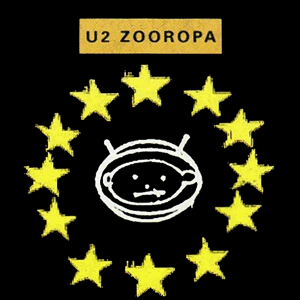
"Zooropa" is a song by Irish rock band U2, and is the opening track from their 1993 album of the same name. The song was the result of combining two pieces of music, the first of which was conceived in the studio, and the second of which was a soundcheck recording from one of the group's concert tours that was discovered by guitarist the Edge. The lyrics were written by lead vocalist Bono and describe two characters in a brightly lit city in a futuristic version of European society. Some lyrics in the song were taken directly from advertising slogans, and they also featured the phrase "dream out loud", which has appeared in other U2 media. The song touched on several themes, including moral confusion and the future of European society.
"Gone" is a song by Irish rock band U2, and is the seventh track on their 1997 album, Pop. It is also included on their 2002 compilation album, The Best of 1990–2000, in a reworked version. A highlight of the PopMart Tour, it was often dedicated to Michael Hutchence during the final few months of the PopMart Tour and during the following Elevation Tour. Lead vocalist Bono frequently refers to it as one of his favorite songs of the band's. Guitarist the Edge has also stated he was very pleased with the "New Mix" of the song available on The Best of 1990–2000.
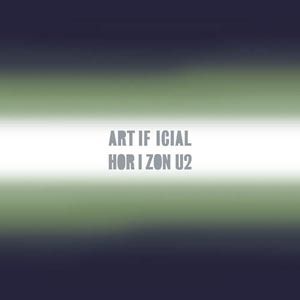
Artificial Horizon is a compilation album of remixed tracks by rock band U2. It was released exclusively to subscribing members of U2.com, replacing Medium, Rare & Remastered. The remix CD is of a similar vein to the band's 1995 release Melon: Remixes for Propaganda, which was also released exclusively to fans. A triple-vinyl edition was released to the general public until 14 May 2010; this version included an MP3 for the Snow Patrol remix of the song "Unknown Caller".
